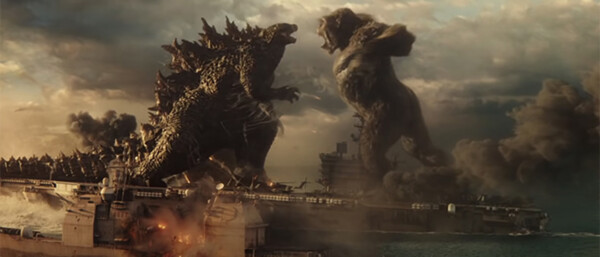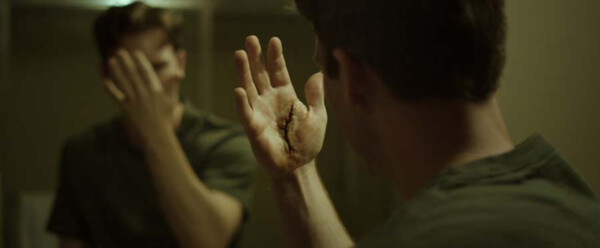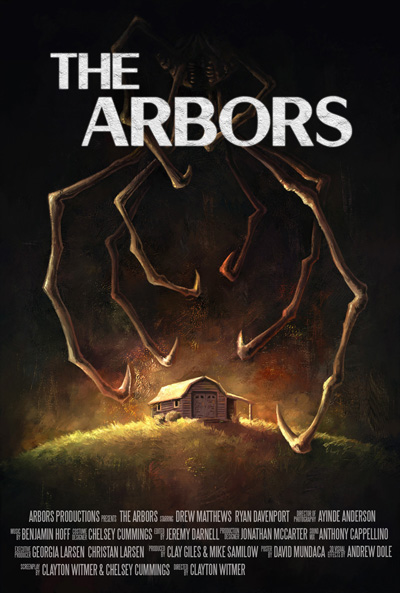Del and Mladen review ‘Godzilla vs. Kong’

Image courtesy of Warner Bros. and Toho.
“Godzilla vs. Kong” Starring Alexander Skarsgard, Millie Bobby Brown, Rebecca Hall, Shun Oguri and others. Directed by Adam Wingard. 113 minutes. Rated PG-13. Theaters and HBO Max.
Del’s take
It’s quite the compliment to the Florida Panhandle that “Godzilla vs. Kong” opens with the king of the kaiju unleashing radioactive hell on the Apex Cybernetics facility in Pensacola, though I doubt the Chamber of Commerce is holding mixers to revel in its newfound celebrity. Still, it’s cool for us nerdists and might help the next Pensacon recruit some real celebrity muscle.
Meanwhile, that maiden salvo of destructo-porn sets the pace for this third installment of the “new” Godzilla, who in my book looks a lot less charming or even convincing than the original guy in the rubber suit. Freshened up with modern FX and a 21st century sensibility, Godzilla stomps onto the screen as an avenging angel out to punish mankind for making such a sloppy mess of the Earth. But then he’s always done that.
Next you’ve got Kong, the giant ape, who has received an updated and politically correct sentience PLUS a sense of morality to boot. When the two square off it’s not a clash of titans but a clash of value systems, with an evil corporation – yes, there’s always an evil corporation – operating as the fulcrum for the conflict.
“Godzilla vs. Kong” is the story – well, it’s three stories really – of Kong’s attempt to finally go “home,” Godzilla’s attempt to make sure he remains at the top of the apex predator heap and Apex Cybernetics’ attempt to obtain a new and powerful energy source that will allow them to engage full-throttle in various evil, shadowy, corporation-y things.
The particulars are a lot more confusing and I will go into them only to the extent of setting the stage: The Apex Corporation has discovered a new source of energy in a hollow realm at the center of the Earth and needs this energy to adequately power a “project” it is working on. It hires expert Nathan Lind (Alexander Skarsgard) to lead an expedition there, assisted by Dr. Ilene Andrews (Rebecca Hall) and her hearing-impaired daughter Jia (Kaylee Hottle), who are studying Kong. Apex needs Kong to show them the source of this new energy. Meanwhile, Godzilla, responding to its natural imperative to be the biggest and baddest monster of ’em all, senses the presence of Kong and goes on the offensive, much to the chagrin of Monarch Project scientist Mark Russell and his monster-attuned daughter Madison (Millie Bobby Brown). She teams up with conspiracy investigator and podcaster Bernie Hayes (Brian Tyree Henry) to investigate Godzilla’s newfound aggression and whatever link that might have to Apex, and drags along her buddy Josh Valentine (Julian Dennison) as comedic ballast.
Did I mention it was complicated?
Suffice it to say that all three storylines converge and loose strings are tied after some romp ’em stomp ’em, bad-ass kaiju/Kong butt-kicking. Some of the resolutions are happy while others are merely satisfying. The point is, the viewer will have been entertained for two hours and Legendary Entertainment and Warner Brothers will have earned another $200 million, which should keep the lights on over the next few weeks.
The performances are all good. I would single out young Kaylee Hottle as Jia, the remaining member of a tribe that was extinguished on Skull Island by a natural disaster, as the showcase of the lot. She and Kong were kindred spirits in loss, and her performance effectively portrayed that subtextual link in their relationship.
The rest of the movie was not as compelling. The original “Godzilla” exhibited a kind of primeval ferocity that has endured over the past 66 years and inspired countless sequels and remakes, most of which traded the animal nobility of the original for cheap yucks and self-parody. The modern iterations – “Godzilla,” “Godzilla: King of the Monsters” and now “Godzilla vs. Kong” – exchange parody for politically correct, touchy feely emotional imperatives that are no more satisfying to the palate than a quivering plate of tofu prime rib.
What saves “Godzilla vs. Kong” are the spectacular special effects, the fight scenes between Kong and Godzilla, and Kong’s humanity, which worked a lot better than it should have. It really felt like Kong was one of the characters and not merely a CGI-generated killer ape.
If the story had been as strong as the acting and special effects, I’d give the movie an A. As it is, “Godzilla vs. Kong” gets a B. It’s better than some other B-graded movies but not as good as others, and I think that’s fair. I can’t advise you to see the movie in a theater in the middle of a global pandemic, but I expect it’s a visual spectacle on the big screen.

Mladen’s take
“Godzilla vs. Kong” is a bonkers movie. Del’s modulated review of the film is, ah, too modulated. Because “G v. K” is utterly bonkers, the film deserves an extreme grade, A or F. But, because I saw the movie at an Imax theater my perception has been distorted. Let me tell you, Imax sound makes my fairly sophisticated, newish AVR-driven, 7.1 surround-sound system sound like an AM broadcast from 1930.
“G v. K” is an F, if you’re interested in a story that links the Monsterverse’s previous three movies to its fourth. I was insulted by the film’s flimsy, disingenuous effort to make it seem part of a continuity. Particularly distasteful was the improper dose of homage to the name of Serizawa. Depending on my mood, I may even characterize it as insulting. The physics of Hollow Earth is bonkers. Godzilla and Kong balancing while they fight on a ship that’s, I don’t know, a magnitude lighter and significantly less wide than the beasts are tall is bonkers. G and K fall overboard to fight underwater and the humans try to help Kong by launching Hedgehog-like depth charges to disorient the reptile and it worked. Bonkers. Why wouldn’t Kong get disoriented, too, and continue on his merry way to drowning? Huh? If the Kong whisperers were worried about Godzilla sniffing out Kong if the ape left his Skull Island containment facility, why would they transport Kong by boat across the Pacific? Godzilla is amphibious. Godzilla lives in the ocean. Godzilla has, apparently, extrasensory power to detect an Alpha interloper. Transport by water was bonkers. Hell, a few scenes later, the humans are moving the ape to Antarctica via sling and a lot of helicopters. Bonkers storytelling to the left of me. Bonkers storytelling to the right. I bonked my head a few times to orient myself to the insane worldbuilding, the deconstruction of the storyline in the preceding three Godzilla films, or the uselessness of the daughter of the bad guy. What the hell happened to the eco-terrorist dude in “Godzilla: King of Monsters” who bought a severed Ghidorah head from some down-on-their luck fishermen?
In the areas – vision, plot, script writing, directing – that make or break a movie, “G v. K” is sheer F-ness. Really. No joke. I’m serious. The fact that the visual and sound effects are so good augments the F-ness. It’s clear that producers and the director thought they could substitute coherence and the internal logic an impossible movie premise must generate for a lot of spectacular FX fighting and some damn fine sound effects. The soundtrack is good as is most of the acting. Where Del the modulator gives the kid in the film kudos, I bow to Rebecca Hall’s Andrews. Her delivery of lines and an assortment of gestures help mitigate the harshness of the dys-reality of the realm created in G v. K. Hall did for “G v. K” what Mila Kunis’s Jupiter did for “Jupiter Ascending,” plausibly explain or soften the absurdity of what unfolds on the screen.
Yes, I’ll probably see “G v. K” in an Imax theater, again. Yes, I’ll buy the movie in Blu-ray format when it becomes available. But, listen to me, “G v. K” is crappy, unless you’re sound-o-phile.
Mladen Rudman is a former journalist and technical writer. Del Stone Jr. is a former journalist and author.
It was an unpleasant reminder of life under the previous administration and I refused to be a part of it.
I unfriended two people on social media today for circulating rumors about the current president and vice president. I’ll do it again and I’ll keep doing it until I have no friends left if I have to.
One of the rumors was that President Biden has Alzheimer’s disease.

Biden has never been diagnosed with Alzheimer’s disease. He has not, to my knowledge, been tested for cognitive decline. His predecessor bragged about “acing” a cognitive test that required him to memorize the words “person, woman, man, camera, TV.” Too bad they didn’t ask him to memorize “compassion, humility, generosity, truth, law.”
Neurologists who have observed Biden’s performance both during the election campaign and after he assumed the presidency say he does not exhibit signs of having Alzheimer’s.
What Biden does have is an inability to speak with articulation, and a speech impediment. Speech pathologists say Biden appears to be thinking of multiple subjects as he speaks, which can cause him to lose his train of thought and not complete his original point. Also, a common strategy for managing a stutter is to pause in one’s speech until the urge to stutter passes, then resume speaking.
Unless we are descending into the barbarism that characterized the previous four years, when people with disabilities where ridiculed and mocked, I see no value in spreading malicious rumors about Biden.
When he is diagnosed by a neurologist, not a urologist with an agenda, and the rumor becomes a fact, then it will be OK to say he has Alzheimer’s. But when it’s Cousin Jed on Facebook making the diagnosis, well, Cousin Jed and his ilk can pop another Natty Lite and sashay across the barn floor at their little hate hoedown by themselves.
The other rumor is that Vice President Harris was a “call girl.”
I had to do a doubletake on that one. I had never heard it before. A “call girl”? Really? So of course I turned to my friend Google for a possible answer.
The rumor seems to be an outgrowth of a one-year relationship Harris had with former San Francisco Mayor Willie Brown. He was married at the time, though he and his wife had been separated for 10 years. The rumor-mongers have it that Harris was a “high-priced call girl” paid to attend events with Brown. A few things about that.
Dating somebody who occupies a spot higher on the power curve doesn’t make one a “call girl” or a “gigolo.” It might make them an ambitious power-grasper and that was my impression of Hillary Clinton after she remained with hubby Bill once the Monica Lewinsky story came to light. But I have no reason to think that about Harris because I don’t know a whole lot about her relationship with Brown. Maybe they actually liked each other. I don’t know, and I hasten to add that Cousin Jed on Facebook doesn’t know either. I also hasten to add that even if Harris did pursue a relationship with Brown to further her career, that peccadillo is about a 2 on a 1-to-10 scale of sin. It certainly doesn’t make her a “call girl.” And in light of the actual crimes, possible crimes, and documented cases of favor-currying, exhibitions of execrable taste and embarrassing improprieties by the previous administration that were either overlooked or forgiven, I see no reason for critics to fuss about Harris’ strategies for breaking the glass ceiling.
But mostly I just don’t want to hear this nonsense anymore. I’ve filled this lifetime’s quota of science-hating disinformation, agenda-driven quackery and political jingoism mindlessly and irresponsibly circulated by uninformed xenophobes who would rather support a traitorous insurrectionist criminal than allow a trans woman to hold a Cabinet-level position.
My solution is to delete the @$%&ers. I know. Not very nice.
But it’s what I got for now.
About the author:
Del Stone Jr. is a professional fiction writer. He is known primarily for his work in the contemporary dark fiction field, but has also published science fiction and contemporary fantasy. Stone’s stories, poetry and scripts have appeared in publications such as Amazing Stories, Eldritch Tales, and Bantam-Spectra’s Full Spectrum. His short fiction has been published in The Year’s Best Horror Stories XXII; Alfred Hitchcock’s Mystery Magazine; the Pocket Books anthology More Phobias; the Barnes & Noble anthologies 100 Wicked Little Witch Stories, Horrors! 365 Scary Stories, and 100 Astounding Little Alien Stories; the HWA anthology Psychos; and other short fiction venues, like Blood Muse, Live Without a Net, Zombiesque and Sex Macabre. Stone’s comic book debut was in the Clive Barker series of books, Hellraiser, published by Marvel/Epic and reprinted in The Best of Hellraiser anthology. He has also published stories in Penthouse Comix, and worked with artist Dave Dorman on many projects, including the illustrated novella “Roadkill,” a short story for the Andrew Vachss anthology Underground from Dark Horse, an ashcan titled “December” for Hero Illustrated, and several of Dorman’s Wasted Lands novellas and comics, such as Rail from Image and “The Uninvited.” Stone’s novel, Dead Heat, won the 1996 International Horror Guild’s award for best first novel and was a runner-up for the Bram Stoker Award. Stone has also been a finalist for the IHG award for short fiction, the British Fantasy Award for best novella, and a semifinalist for the Nebula and Writers of the Future awards. His stories have appeared in anthologies that have won the Bram Stoker Award and the World Fantasy Award. Two of his works were optioned for film, the novella “Black Tide” and short story “Crisis Line.”
Stone recently retired after a 41-year career in journalism. He won numerous awards for his work, and in 1986 was named Florida’s best columnist in his circulation division by the Florida Society of Newspaper Editors. In 2001 he received an honorable mention from the National Lesbian and Gay Journalists Association for his essay “When Freedom of Speech Ends” and in 2003 he was voted Best of the Best in the category of columnists by Emerald Coast Magazine. He participated in book signings and awareness campaigns, and was a guest on local television and radio programs.
As an addendum, Stone is single, kills tomatoes and morning glories with ruthless efficiency, once tied the stem of a cocktail cherry in a knot with his tongue, and carries a permanent scar on his chest after having been shot with a paintball gun. He’s in his 60s as of this writing but doesn’t look a day over 94.
Contact Del at [email protected]. He is also on Facebook, twitter, Pinterest, tumblr, TikTok, and Instagram. Visit his website at delstonejr.com .

Image courtesy of The Arbors Production with The Red Arrow Studios Company.
“The Arbors” Starring Drew Matthews, Ryan Davenport, Sarah Cochrane and Alexandra Rose. Directed by Clayton Witmer. 1 hour, 59 minutes. Unrated. Streaming on Amazon Prime, Tubi TV.
Del’s take
Ethan Duanes (Drew Matthews) has a problem.
His problem is life.
Ethan is a locksmith but he cannot unlock the secret to happiness. All he can do is remember an earlier time when his parents were still alive and his younger brother a constant companion. The world seemed better then.
Now, the world isn’t better. His parents have passed away and his brother, Shane (Ryan Davenport), has started a family. The ancestral home, like Ethan, is slowly succumbing to rot and ruin, and the future seems as dark as the night shifts Ethan works.
One night, as Ethan is driving back to his rented house after a call, he comes across a dead deer in the road. He notices something moving inside the deer, a kind of insect or arachnid. He takes the carcass home, builds a container to hold the strange creature and lures it inside with cuts of meat. Then, he proceeds to care for it.
Until the creature breaks out. And people in the community begin to die.
That is the premise of “The Arbors,” a “monster movie” that isn’t a “monster movie.” It is less about things that go bump in the night as things that go bump in the heart.
“The Arbors” earns high marks for its layers and its obvious pathos. Ethan is a sympathetic loser to whom many people can relate: He is overwhelmed by life, fearful of change and nostalgic for the simpler times of the past. This theme of resistance to change operates throughout the movie – Ethan says it more than once by rhetorically asking, “Can’t this all be over?” His fidelity to the past is expressed in other ways, too. He is constantly sorting through photographs of him and his brother when they were kids. He gives his brother the gift of a toy soldier from a game they played as children called Out of Time! Ethan has kept the game; his brother absent-mindedly drops the toy soldier on the floor and before movie’s end it returns to Ethan’s possession. Ethan tells his young niece, Robin (Sarah Cochrane), he hopes to purchase the family home and restore it so that he may live there again. When Shane reveals he and his wife, Lynn (Alexandra Rose) are contemplating a move out of state, Ethan becomes agitated and for once, shows strong emotion.
Where “The Arbors” fails is its glacial pacing and the infuriating passivity of its viewpoint character. Ethan doesn’t simply miss the past; he is mired in it and will never escape. He rejects chance after chance to change his circumstances, at one point avoiding a former friend who has offered to take him away from his ennui and show him the world. In truth he doesn’t want to escape, and he would draw everybody around him into the tar pit of his inertia. This slow vortex of apathy oozes over both character and audience alike, preserving the misery in a sluggish and vapid shadowbox that never answers the question “Why?”
And when the “monster” kills people who have threatened Ethan’s attempt to restore the past to the present, “The Arbors” morphs into “Donnie Darko” and the audience is left with a new batch of questions.
What’s remarkable about “The Arbors” is that it was shot in the Winston-Salem, N.C., area in 25 days on a budget of $14,000, then finished for another $11,000.
Witmer deserves kudos for trying to rise above the meager expectations of the genre, but “The Arbors” has some deficiencies that outweigh its virtues. Still, it’s not a bad movie. Just slow, with unanswered questions and motivations. I expect Witmer will do better his next time out of the gate.
I grade “The Arbors” a C+.

Mladen’s take
Through much of “The Arbors” I kept telling myself, “Wow, the kid playing the principal misfit really looks like a young Dennis Quaid.”
That’s how I managed to stay entertained when “The Arbors” got batty or the story cryptic or incoherent, which wasn’t all the time. Just much of the time.
Del blew a lot of words summing the plot. I’ll do it for you with one, short sentence: Rogue nostalgia is a deadly when you’re connected to person-sized spider with a mammal-like mouth packing white shark teeth.
One of my biggest problems with the movie is that I have no idea how or why Ethan and pseudo-spider are telepathically linked. If I was the angry wayward mutant arachnid, I’d be pissed at Ethan for putting me in a cage when I was but a maggot or whatever. That would be reason enough to eat his eyeballs rather than serve as an executioner for the human.
And, who the hell where those guys in the white hazmat suits? And, why didn’t at least one of them have a gun for self-defense because they were chasing an aberration of nature?
I don’t mind that “The Arbors” portrays itself as horror but is really about shitty, navel-gazing stuff like hurt feelings. People, after all, are more frightening than zombie werewolves with rabies waving Trump is My President flags. But, at times, I felt like I was watching, I don’t know, “Kramer v. Kramer” or “Steel Magnolias.”
The problem is that the film seems to want to get good and then backs off. A scene of driving at night might be too long. Or there’s the crappy voice acting when Ethan is talking to someone on his flip phone. Yes, director, I get it that Ethan is stuck in a time that no longer exists. And, why the fuck does “Connie” care about Ethan? She didn’t even sign his high school yearbook. What proof is there that she let him feel her up when they were teenagers or that they went to prom together? She materializes, tries to get him to leave town, and then de-materializes.
On the plus side, “The Arbors” provides a holistic moodiness as the backdrop of life in an unnamed town somewhere in the foothills of the Appalachians. Everything seems afflicted by Ethan’s desperate unhappiness. I liked the score. It meshed nicely with the moodiness.
The movie gets a C- because it failed to meet its promise to me like life failed to meet its promise to Ethan. It didn’t allow him to stay 13 years old forever. And, the film failed to create a sympathetic, lonely man with control of a monster who I could like.
Mladen Rudman is a former journalist and technical writer. Del Stone Jr. is a former journalist and author.